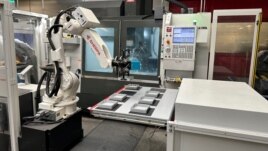31 October 2023
German businesses are increasingly turning to robots to fill jobs as the country faces a severe labor shortage.
The situation left about 1.7 million jobs unfilled across Germany in June, official data showed. The country's Chambers of Commerce and Industry has estimated that half of German businesses are currently struggling to fill positions. Germany is Europe's largest economy.
One of the country's biggest labor issues is the large number of people retiring from the so-called Baby Boomer generation. People in this group are between the ages of 57 and 75. The nation's birth rate has also been going down for years.

A robot machine is seen at ROLEC Gehause-Systeme in Rinteln, Germany on October 6, 2023. (Courtesy of Matthias Rose/Handout via REUTERS)
Economic experts say it is difficult to replace these retiring workers. Many younger workers do not want to take jobs seen as dirty and dangerous.
The job shortage situation is currently reducing growth in Germany by about $109 billion a year, official estimates suggest. The Federal Employment Agency predicts the amount of available workers will shrink by 7 million people by 2035.
The problem is affecting large, medium and small businesses across the country. Some have decided to replace retiring workers with robotic systems.
With similar issues affecting other developed economies, robotic and artificial intelligence (AI) technologies will continue to expand, said Nela Richardson. She is the chief economist at financial provider ADP.
"Long term, all those innovations are a game-changer for the world of work. Everybody will do their job differently," Richardson told Reuters.
Heavy investment in automation by carmakers and other major industrial companies has made Germany the world's fourth-largest market for robots – the largest in Europe.
But as robots become less costly and easier to operate, even smaller companies are also using them. The International Federation of Robotics has estimated that about 26,000 robotic machines were put in place in Germany last year.
"Robots enable the survival of companies that see their future at risk due to staff shortages," said Ralf Winkelmann, director of FANUC Germany. The company sells about half its Japanese-made robots to small and medium-sized businesses.
Family-run ROLEC is a German company that produces systems to protect industrial electronics and control equipment. It bought its first robot last year to permit production to continue at night. ROLEC has already bought a second machine and plans to continue investing in automation.
"It is great when you turn on the light in the morning and the parts are in the storage container and have been processed," ROLEC's CEO Matthias Rose told Reuters.
Industry experts say increasing robotic operations are also a sign that robots have become easier to use, with no special skills required. Most now come with a Human Machine Interface, which operates similarly to a smartphone, said Florian Andre. He is a co-founder of SHERPA Robotics, a start-up that targets companies with between 20 and 100 employees.
Even workers and trade unions – which in the past were fearful of job losses linked to robots – have taken an increasingly favorable position. A public opinion study published in June by a robots marketplace organization found that nearly half of German employees see robots as a help to the labor shortage.
I'm Gena Bennett.
Reuters reported this story. Bryan Lynn adapted the report for VOA Learning English.
_____________________________________________
Words in This Story
innovation – adj. the act or process of introducing new ideas, devices, or methods
automate – n. to control something using machines and not people
staff – n. the people who work for an organization
union – n. an organization of workers formed to protect the rights and interests of its members